
This article was updated on April 18th, 2023
Seeing your dog vomit is upsetting enough, but vomiting blood can be downright scary. So what are the possible reasons for vomiting blood? When should you take your dog to the vet?
This article is written by our veterinarians to help you understand the most common causes for dogs vomiting blood, how it’s treated, and when to seek veterinary attention. You can also check out the related posts below to see if one of our articles about dogs vomiting blood matches your particular situation better:
Related posts about dogs vomiting blood:
- Dog Vomiting Blood – but Acting Normal: if your dog is not showing other signs of illness (such as lethargy, lack of appetite, etc).
- Dog Vomiting Blood – with Specks or Clots of Blood: if your dog has vomited small specks of blood.
- Dog Vomiting Blood – with Mucus: if your dog’s vomit contains both blood and mucus.
Let’s review the top reasons causing blood in a dog’s vomit, and what to do.
Top Reasons Causing Blood in a Dog’s Vomit

The medical term for vomiting blood is hematemesis and its causes range from mild to life-threatening. Anything from a minor mouth injury or irritation from repetitive vomiting after a tummy upset could cause your dog to vomit small amounts of blood. Many of these conditions are easily treated by your vet.
Some of the most common causes for vomiting blood include:
- Infections (bacterial and viral e.g canine parvovirus)
- Repetitive and prolonged vomiting
- Parasites
- Traumatic injury to the digestive tract, mouth, nose, or respiratory tract
- Hemorrhagic gastroenteritis, a condition causing a sudden onset of bloody diarrhea and vomiting
- Gastrointestinal foreign body (swallowing items they shouldn’t like a skewer or corn cob)
- Stomach ulcers
- Inflammatory bowel disease (IBD)
- Cancer
- Toxins such as rat bait or certain medications (NSAIDs or non-steroidal anti-inflammatories)
- Conditions that affect blood clotting (coagulopathy)
- Snake bites
Because these causes are so varied and can range from mild to life-threatening, it’s important that you seek veterinary attention even if you only notice a small amount of blood in your dog’s vomit.
So how can you figure out what’s causing the blood in your dog’s vomit? Let’s look at what blood in a dog’s vomit looks like – with 5 pictures showing different types of vomit.
What Does Your Dog’s Vomit (with Blood) Look Like? 5 Pictures.
Blood in a dog’s vomit can take many shapes and forms. Blood may appear in the vomit as fresh blood, blood clots or digested blood, which resembles dark coffee grounds. The appearance of blood in your dog’s vomit or feces can help your veterinarian determine where the blood might have come from and narrow down underlying causes.
Which of these 5 pictures below does your dog’s vomit most look like? Let’s review a few examples, with pictures:
1. Your dog’s vomit contains small specks of blood mixed with phlegm or mucus
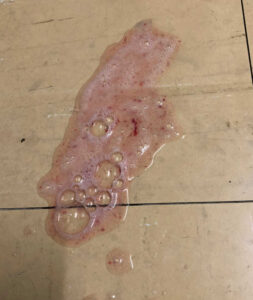
Small amounts of red blood in a dog’s vomit could be due to several issues or medical conditions. The most likely causes include the following:
- irritated esophagus or pharynx
- broken blood vessels in esophagus
- bleeding from nose
- infected/broken tooth
- trauma in mouth
- clotting disorder
- cancer
- parasites
- rodenticide toxicity
If your dog’s vomit contains small blood clots or specks of blood, read our article: Dog Vomit with Specks of Blood or Blood Clots.
2. Your dog’s vomit contains moderate amount of blood mixed in liquid
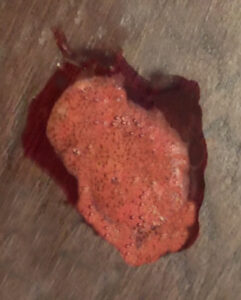
In this situation, the amount of blood in your dog’s vomit appears to be higher, mixed with mucus. The most likely causes include the following:
- gastrointestinal foreign body or obstruction
- clotting disorder
- cancer
- internal bleeding
- rodenticide toxicity
- severe oral trauma
- nosebleed
Learn more Dog Vomiting Blood and Mucus: What to Do.
3. Your dog’s vomit contains coagulated blood (which looks like coffee ground)
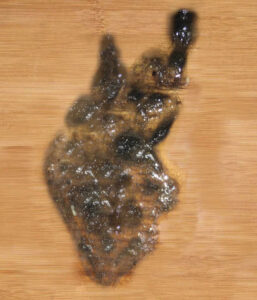
If your dog’s vomit appears to contain blood that looks almost black or has the appearance of coffee ground, the following causes are more likely:
- bleeding in the gastrointestinal tract
- clotting disorder
- gastrointestinal foreign body or obstruction
- cancer
- parasites
4. Your dog’s vomit shows a moderate amount of blood mixed in food

The most likely medical conditions causing dog vomiting with a moderate amount of blood mixed in food includes:
- gastrointestinal foreign body or obstruction
- cancer
- internal bleeding
- clotting disorder
- parasites
- rodenticide toxicity
- nose bleed
5. Your dog’s vomit contains a large amount of frank red blood

If your dog is vomiting large amounts of blood, it is an emergency, and they must be taken to a veterinarian immediately. Causes could include:
- severe internal hemorrhage
- rodenticide toxicity
- severe clotting disorder
- trauma
- cancer
Important tip: Remember that you can not draw a definite conclusion based on a picture alone. It’s important to meet with your veterinarian to do a full physical exam to understand the true cause of your dog’s ailments.
Is Blood in Your Dog’s Vomit an Emergency?

Unfortunately, some extremely serious medical conditions can also cause hematemesis, including deadly toxins, cancer, or a perforated bowel after swallowing a sharp object. These conditions are an emergency requiring urgent veterinary care. But how do you tell the difference and what should you do?
Hematemesis is not uncommon in dogs, so if you’ve noticed that your dog has vomited a small amount of blood and is otherwise acting normal, start by calling your regular vet first for advice.
It’s also important to know when vomiting blood is an emergency and requires an immediate trip to your nearest emergency vet clinic. Signs that your dog needs urgent veterinary attention include:
- Pale or white gums
- Collapse or severe weakness/lethargy
- Vomiting large amounts of blood (or severe blood loss of any kind)
- Difficulty breathing
- Pain or distress
- Diarrhea, especially if it has blood
Tip: If you can, take a picture of your dog’s vomit to show to your vet. It may help them to narrow down the list of possible causes.
How to Find Out if Your Dog’s Blood in Vomit is Serious
A veterinarian will likely ask you some of the following questions to help work out why your pup is vomiting blood. Though these questions can be a little unpleasant, they can really help your vet get to the bottom of the problem:
- What did the vomit/blood in the vomit look like?
- How much blood was present in the vomit?
- What color was the blood in the vomit (bright red, dark brown etc.)?
- Was there an even mixture of red in the vomit, or was it limited to streaks of blood?
- How many times has your dog vomited/vomited blood and when did it start?
- Has your dog shown any other signs of illness (e.g lethargy, diarrhea)?
- Could your dog have had access to anything toxic such as rat bait or medications?
- Is your dog likely to have chewed up or swallowed any inedible items?
These questions may vary depending on your dog’s medical history and their unique situation.
What Will my Veterinarian Do?
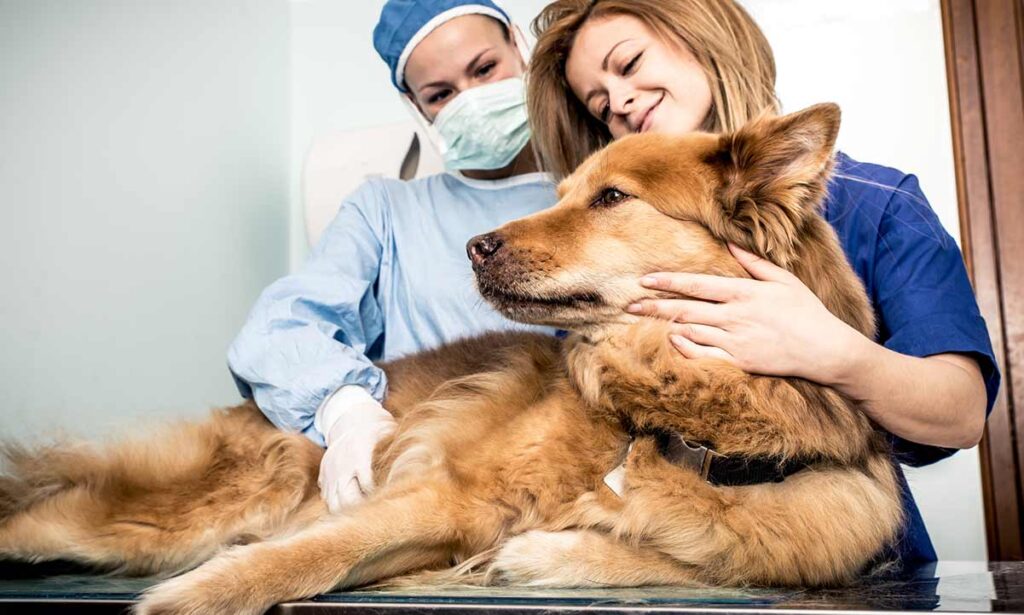
Your veterinarian will start by taking a thorough medical history and checking your dog over carefully. They will then determine which diagnostic tests they need to run to find out why your dog is vomiting blood. These diagnostic tests may include:
- Blood tests including blood clotting (coagulation) tests
- Testing for infectious diseases such as canine parvovirus (CPV)
- Urine or fecal tests
- X-rays (radiographs)
- Abdominal ultrasound
What Should My Dog Eat After Throwing Up Blood?

Always follow your veterinarian’s instructions closely as they may vary depending on the underlying cause. In some cases, your pup may need to withhold food and water for a short period of time. When it is time to feed your pup, small, frequent meals are usually recommended of a highly-digestible and low-fat dog food. Your vet will have specific foods available at their clinic, specially designed for patients recovering from vomiting and other digestive issues, or will be able to recommend one. Boiled chicken breast (without any skin) is another common recommendation your vet may suggest to feed your pup when they’re recovering.
What are the Treatment Options?
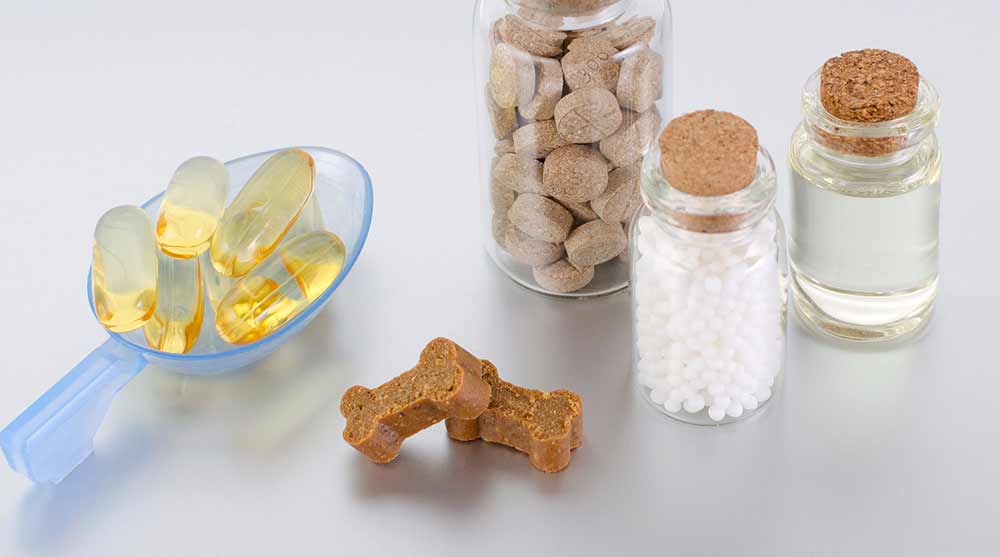
Once your veterinarian has determined the reason why your dog is vomiting blood, they will recommend the best treatment options for your pup. These options may include:
- Medication to help protect the gut and prevent further vomiting or diarrhea
- Pain relief
- Anti-parasite treatment
- Dietary management
However, some of the more serious causes may require your dog to stay in hospital for more intensive treatment including:
- Placing your dog on a drip if they are dehydrated or in shock (intravenous fluid therapy)
- Blood transfusions if there has been significant blood loss
- Surgery to remove a foreign object from your dog’s gut
How Much Will It Cost?
The cost of veterinary care will vary greatly depending on the underlying cause and severity of your dog’s condition. It could range from $150 to over $2,000 depending on the situation. Your veterinarian will discuss their plan of action including diagnostic tests and likely treatment options for your dog first to give you a rough estimate of costs.
Dog Owner’s FAQ with Dr. Joanna Woodnutt
- What if my dog is vomiting blood but acting normal?
Read our article: “Help – my dog is vomiting blood but acting normal“.
- What if my dog has only a small amount of blood or blood specks in vomit?
There are many reasons why your dog might be vomiting blood and they vary from minor health issues to serious medical conditions. This is why it’s extremely important that pet owners seek veterinary advice whenever they notice blood in their dog’s vomit, no matter how small the amount. You can also read our article: “Dog Vomit with Specks of Blood or Blood Clots“.
- Are there any home remedies that can help? How can I help my dog feel better?
If your dog is vomiting blood you should always seek advice from your veterinarian before attempting any home remedies or treatments. Your vet may be able to give you advice over the phone or will recommend bringing your dog in for an exam.
- What does blood in my dog’s vomit look like?
Blood may appear as fresh bright red blood, blood clots, or dark red digested blood that resembles coffee grounds. Blood may be mixed into the vomit so it appears red or pink or might be separate as streaks or clots. View our related article “Pictures of blood in a dog’s vomit” to learn more.
- What if my dog is vomiting blood and mucus at the same time?
Vomiting blood and mucus can be caused by inflammation or ulceration of the gut lining by conditions such as ulcers or canine parvovirus.
- What if my dog is vomiting and pooping blood at the same time?
If your dog has blood in their vomit and feces you need to seek veterinary attention. Common causes may include infection (such as canine parvovirus), gastrointestinal foreign bodies, IBD, stomach ulcers, and HGE (hemorrhagic gastroenteritis).
Related Posts about Dogs Vomiting Issues:
 Dog Vomiting Blood but Acting Normal: Top Reasons and Solutions - A dog who vomits blood is enough to set off alarm bells in your head. Sure, dogs vomit all the… [...]
Dog Vomiting Blood but Acting Normal: Top Reasons and Solutions - A dog who vomits blood is enough to set off alarm bells in your head. Sure, dogs vomit all the… [...] My Dog is Vomiting but Acting Normal: What Could it be? - Dogs vomit for all sorts of reasons. As their loving owners, we naturally become concerned and want to find out… [...]
My Dog is Vomiting but Acting Normal: What Could it be? - Dogs vomit for all sorts of reasons. As their loving owners, we naturally become concerned and want to find out… [...] 3 Home Remedies for a Dog Vomiting White Foam [Vet Advice] - Any time your dog vomits, it may cause your stomach to turn a little with worry and concern. When your… [...]
3 Home Remedies for a Dog Vomiting White Foam [Vet Advice] - Any time your dog vomits, it may cause your stomach to turn a little with worry and concern. When your… [...] Why Dogs Throw Up Undigested Food [with 7 Tips from a Vet] - Doggy vomit. It’s an affliction any dog parent is only too aware of. However, did you know that when it… [...]
Why Dogs Throw Up Undigested Food [with 7 Tips from a Vet] - Doggy vomit. It’s an affliction any dog parent is only too aware of. However, did you know that when it… [...] Dog Who Vomits and Has Diarrhea? Our Vet Shares 4 Tips - In our veterinarian clinic, it is typical for me to see at least 2 to 3 owners each day whose… [...]
Dog Who Vomits and Has Diarrhea? Our Vet Shares 4 Tips - In our veterinarian clinic, it is typical for me to see at least 2 to 3 owners each day whose… [...] What Should I Do if My Old Dog Vomits [3 Tips from a Vet] - Vomiting is a symptom that always causes concern amongst owners, and for good reason. While vomiting can be a sign… [...]
What Should I Do if My Old Dog Vomits [3 Tips from a Vet] - Vomiting is a symptom that always causes concern amongst owners, and for good reason. While vomiting can be a sign… [...]Disclaimer: This website's content is not a substitute for veterinary care. Always consult with your veterinarian for healthcare decisions. Read More.






Be the first to comment